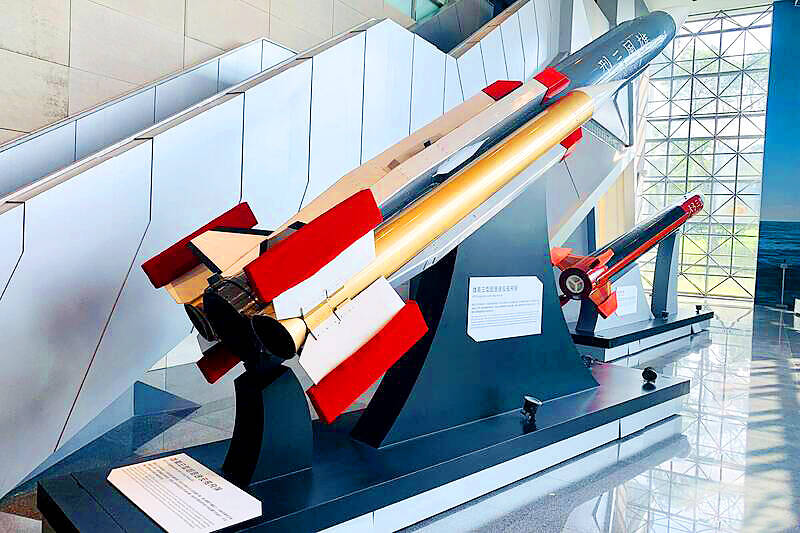The Ministry of National Defense plans to develop supersonic combustion ramjet, or scramjet, technology linked to hypersonic missile systems, a solicitation notice issued by the ministry for next year’s National Defense Advanced Research Program said.
The Chungshan Insitute of Science and Technology would oversee the program to create a heat-resistant composite ceramic material and improve scramjet engine ignition and flame retention, the ministry said in a notice issued to Taiwanese universities in June.
This program — scheduled to be implemented over three years — revolves around materials and technologies underlying scramjet engine performance.

Photo: Chen Chih-cheng, Taipei Times
Hypersonic systems are superior to conventional ballistic missiles with regard to deterrence value, as their speed, altitude and maneuver-in-flight capabilities give the target little time to implement countermeasures or retaliatory strikes.
The scramjet program is evidence that the armed forces likely plan to obtain a type of long-range system capable of deterring China.
Chungshan Institute of Science and Technology adviser Su Yu-pen (蘇玉本) earlier this month said that materials science and thermal design would be crucial in the nation’s bid to develop hypersonic technology.
Taiwan has no lack of resources or expertise in other fields relevant to hypersonic weapon systems, he said.
Separately, the government has issued an airspace closure notice, as the air force is to conduct fighter exercises using live munitions over the ocean to the east of Taiwan from Aug. 27 to Sept. 12.
The air-to-air missile drills would involve F-16 jets armed with AIM-120 and AIM-9X missiles, Mirage 2000 jets armed with the MICA and R.550 Magic missiles, and AIDC-F-CK-1 jets armed with Tien Chien II missiles, a defense official said, speaking on condition of anonymity.
The navy is also holding large-scale weapons exercises in waters east of Taitung and Pingtung County, west of Green Island (綠島) and Orchid Island (Lanyu, 蘭嶼), and south of Orchid Island and Pingtung, government notices have said.
The drills, which likely involve the use of surface-to-air and anti-ship missiles by warships, are to be held until the end of this month, they said.
The large size and unlimited altitude of the exercises imply that a sinking exercise could be included in the drills, sources said.
Last week, the army began conducting “maintenance fire” artillery drills, replacing the live-fire component that used to be included in the annual Han Kuang military exercises.
The Eighth Army Corps and marine units are expected to begin live-fire TOW missile exercises later this month.

AIR SUPPORT: The Ministry of National Defense thanked the US for the delivery, adding that it was an indicator of the White House’s commitment to the Taiwan Relations Act Deputy Minister of National Defense Po Horng-huei (柏鴻輝) and Representative to the US Alexander Yui on Friday attended a delivery ceremony for the first of Taiwan’s long-awaited 66 F-16C/D Block 70 jets at a Lockheed Martin Corp factory in Greenville, South Carolina. “We are so proud to be the global home of the F-16 and to support Taiwan’s air defense capabilities,” US Representative William Timmons wrote on X, alongside a photograph of Taiwanese and US officials at the event. The F-16C/D Block 70 jets Taiwan ordered have the same capabilities as aircraft that had been upgraded to F-16Vs. The batch of Lockheed Martin

GRIDLOCK: The National Fire Agency’s Special Search and Rescue team is on standby to travel to the countries to help out with the rescue effort A powerful earthquake rocked Myanmar and neighboring Thailand yesterday, killing at least three people in Bangkok and burying dozens when a high-rise building under construction collapsed. Footage shared on social media from Myanmar’s second-largest city showed widespread destruction, raising fears that many were trapped under the rubble or killed. The magnitude 7.7 earthquake, with an epicenter near Mandalay in Myanmar, struck at midday and was followed by a strong magnitude 6.4 aftershock. The extent of death, injury and destruction — especially in Myanmar, which is embroiled in a civil war and where information is tightly controlled at the best of times —

Taiwan was ranked the fourth-safest country in the world with a score of 82.9, trailing only Andorra, the United Arab Emirates and Qatar in Numbeo’s Safety Index by Country report. Taiwan’s score improved by 0.1 points compared with last year’s mid-year report, which had Taiwan fourth with a score of 82.8. However, both scores were lower than in last year’s first review, when Taiwan scored 83.3, and are a long way from when Taiwan was named the second-safest country in the world in 2021, scoring 84.8. Taiwan ranked higher than Singapore in ninth with a score of 77.4 and Japan in 10th with

SECURITY RISK: If there is a conflict between China and Taiwan, ‘there would likely be significant consequences to global economic and security interests,’ it said China remains the top military and cyber threat to the US and continues to make progress on capabilities to seize Taiwan, a report by US intelligence agencies said on Tuesday. The report provides an overview of the “collective insights” of top US intelligence agencies about the security threats to the US posed by foreign nations and criminal organizations. In its Annual Threat Assessment, the agencies divided threats facing the US into two broad categories, “nonstate transnational criminals and terrorists” and “major state actors,” with China, Russia, Iran and North Korea named. Of those countries, “China presents the most comprehensive and robust military threat